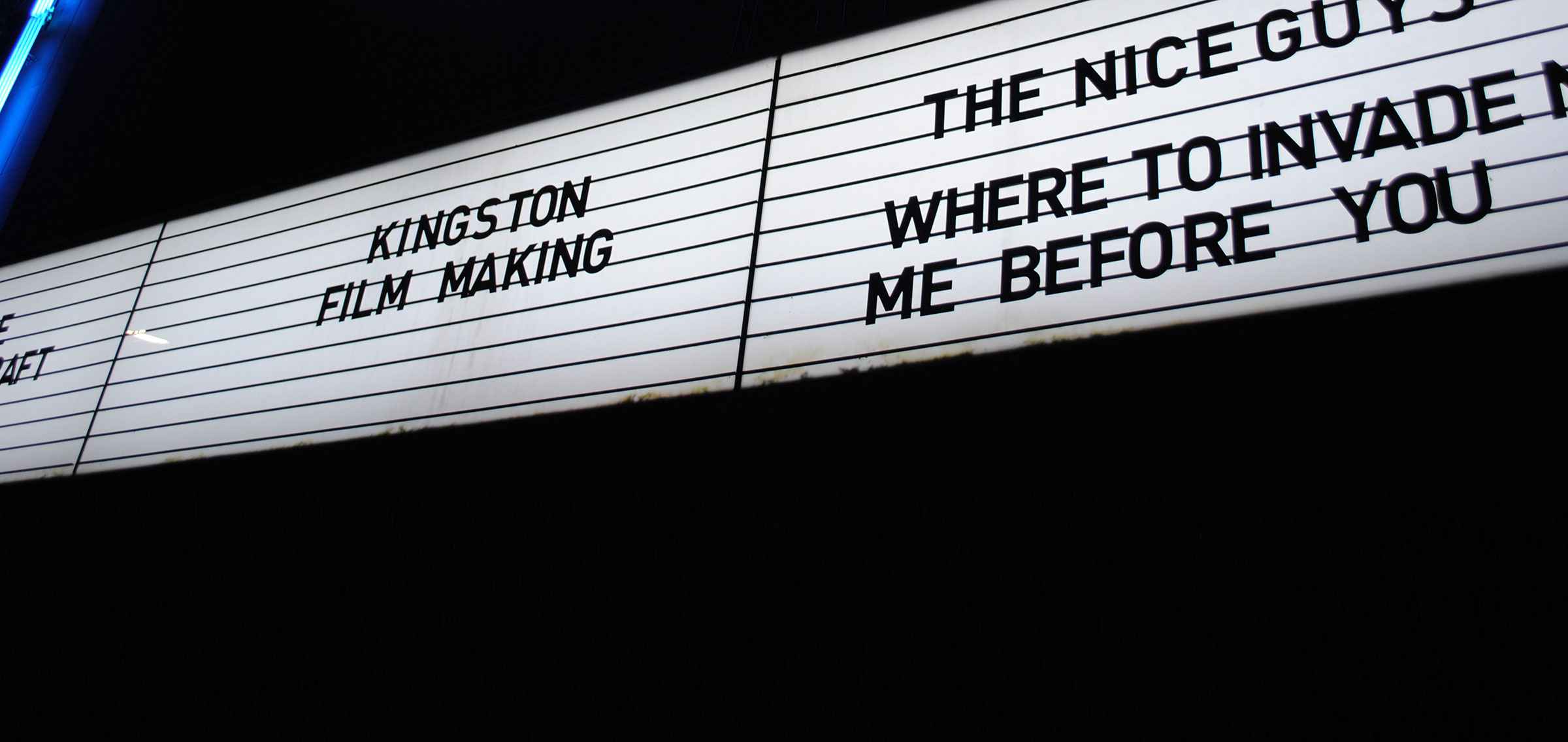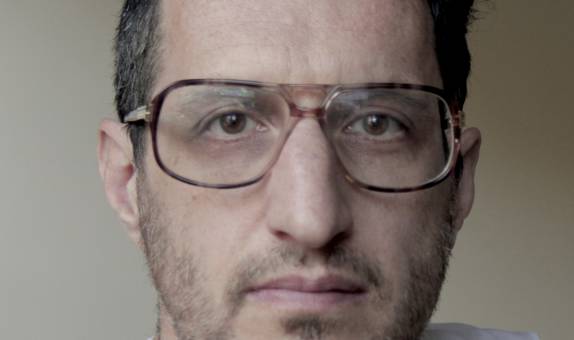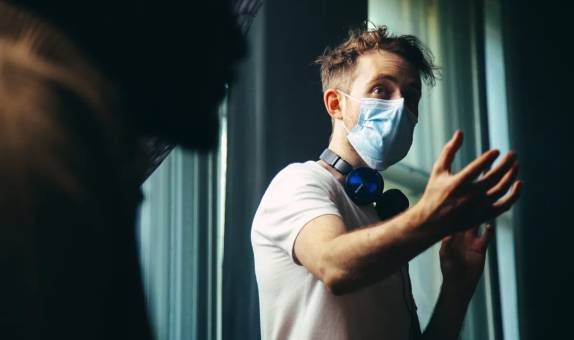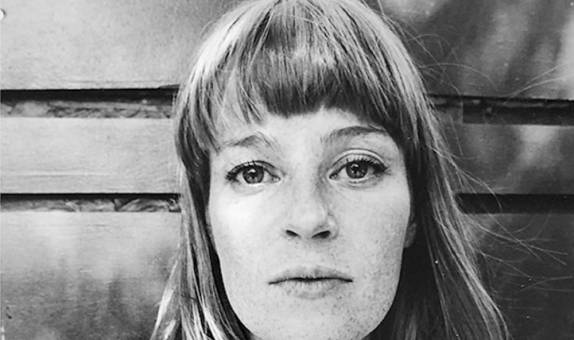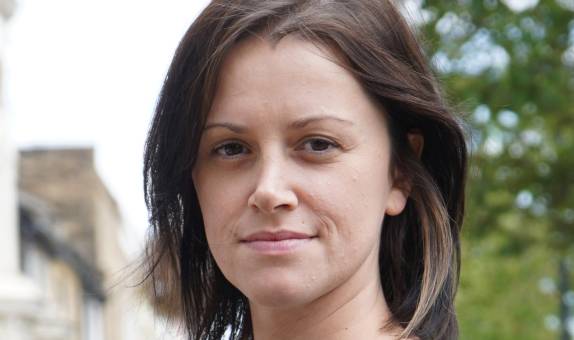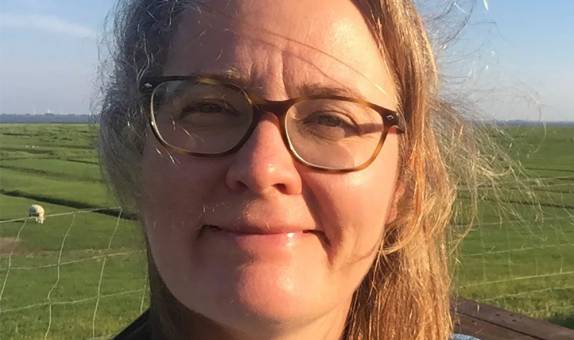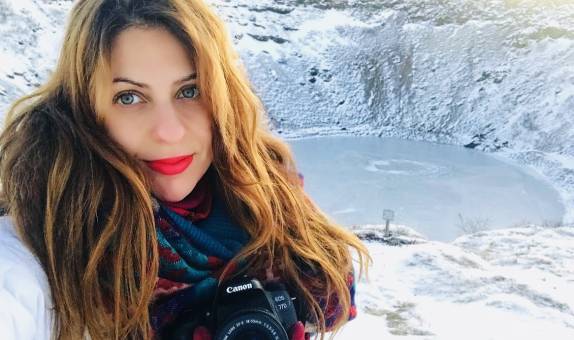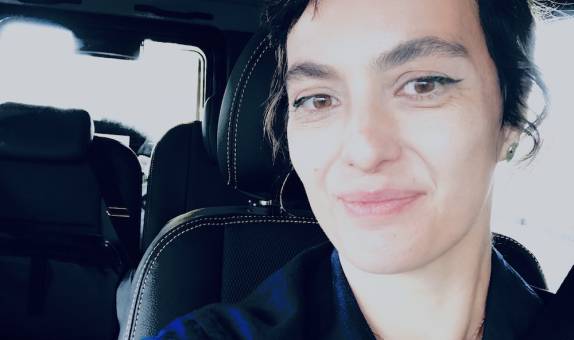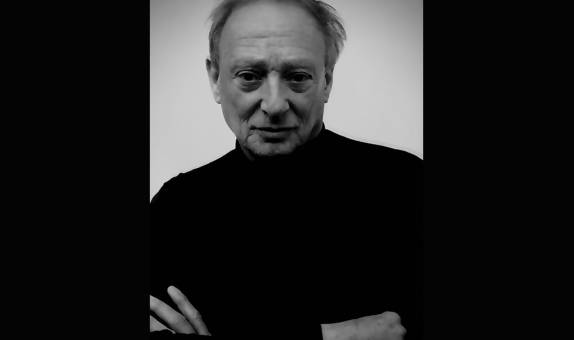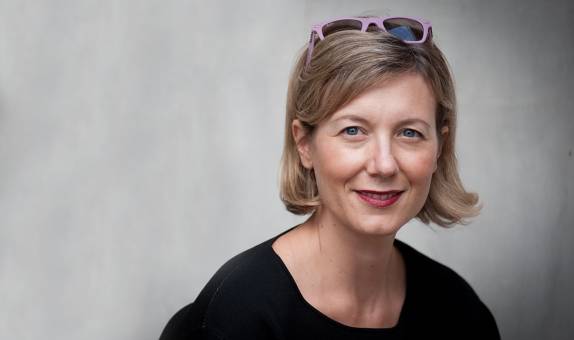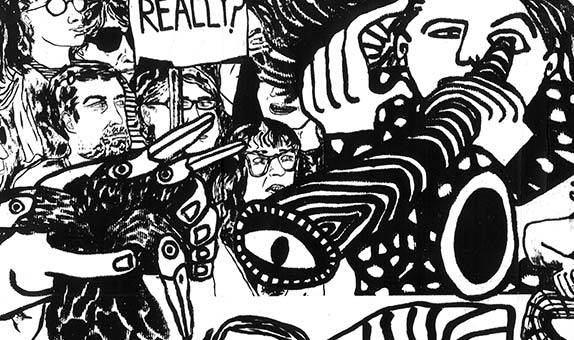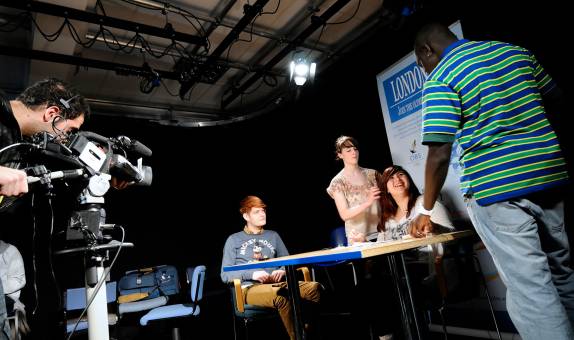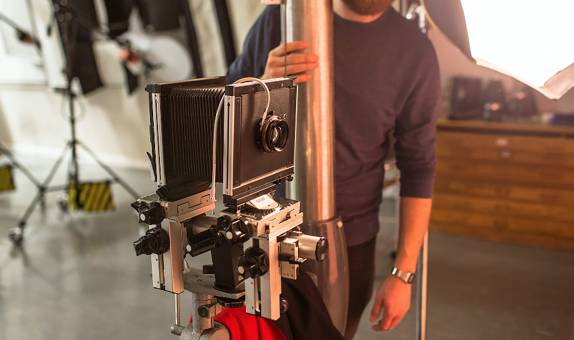Filmmaking BA (Hons)

Teaching Excellence Framework (TEF) Gold award
Our commitment to high quality teaching has been recognised with a TEF Gold rating. The University has received an overall rating of Gold, as well as securing a Gold award in the framework's two new student experience and student outcomes categories.
Why choose this course?
On this course you'll explore the medium of film, developing your own filmmaking practice while acquiring skills for professional work in the creative industries.
You will engage with innovative, ambitious ideas, developing successful films in groups and individually, and gain a practical knowledge of a range of filmmaking approaches. Your learning will be supported by technical inductions, workshops with industry professionals, guest lectures and field trips.
You'll produce films with high production value, through our moving image workshop and with specialist filming equipment. You will be able to experiment with digital and analogue formats, including shooting, processing and scanning 8mm and 16mm film. You will also have access to our 3D workshops, photography darkrooms, printmaking and animation facilities.
You'll be taught by academics who are active practitioners in the film industry, working as artists, directors, cinematographers, editors and producers; they offer access to unique work experience opportunities. For example, our students have participated in placements at the Institute of Contemporary Arts, Film & Video Umbrella and Film London, among other organisations.
| Attendance | UCAS code | Year of entry |
|---|---|---|
| 3 years full time | W620 | 2025 |
Please note: We do not accept applications for Year 2 (Level 5) or Year 3 (Level 6) entry onto this course.
Please note: Teaching on this course may take place on more than one KU campus.
This course is now full for 2024 entry – please apply for 2025 entry.
For 2025 entry, please submit your application before the UCAS deadline as this course may not be in a position to consider applications submitted after this date.
| Main Location | Kingston School of Art, Knights Park |
Reasons to choose Kingston
- We're ranked No.2 in London for Film Production and Photography (The Guardian University Guide League Tables 2023).
- You'll use our inspiring facilities to produce films in analogue and digital formats, with access to high-end and high-speed digital cameras, Super 8 and 16mm film cameras, as well as professional studios and edit suites.
- You'll participate in an annual curated screening of student film work at a London venue. Your final graduation film will also be screened on campus and at a central London cinema with industry guests.
- This creative filmmaking course values diversity and a practical approach. It incorporates multiple approaches to filmmaking, critical thinking, research skills and technical experimentation.
Accreditation
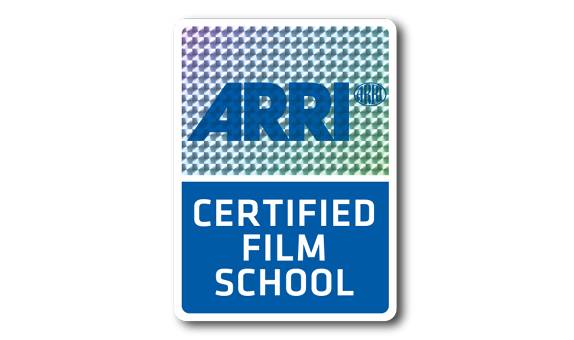
ARRI

Kingston University is an ARRI-accredited Film School. As an ARRI-accredited Film School, final-year students can do an additional ARRI Certified Training for Camera Systems module to enhance their camera skills and CV.
The Art School Experience
As part of Kingston School of Art, students on this course benefit from joining a creative community where collaborative working and critical practice are encouraged.
Our workshops and studios are open to all disciplines, enabling students and staff to work together, share ideas and explore multi-disciplinary making.

Filmmaking at Kingston
What you will study
From conception, ideas and creative strategies of engagement, through pre-production and planning, to the innovative creation of bespoke film projects, this course provides you with a comprehensive understanding of filmmaking and key professional roles in the industry.
Throughout the course you will analyse and explore film specialisms, including directing, cinematography, editing, sound recording and production design to find your own unique career path.
You'll learn how to contextualise, engage with and critique the film industry through your own practice and projects, via taught modules and guest lectures. Upon graduation you'll be well equipped to enter film production employment with confidence and in a variety of guises.
Modules
Year 1
Year 2
Year 3
In Year 1, you are given technical inductions and introduced to film production through creative projects, giving you the opportunity to develop ideas for films and experience a range of production roles. You will develop your research skills and learn about directing, cinematography, sound recording, editing and sound design, running a set in a studio or on location and working with contributors.
Core modules
Sound and Image
30 credits
Filmmaking fundamentals to explore and experiment in innovative ways
In this module, you will develop a number of short film works as an integral part of your introduction to the programme and its expectations. You will be introduced to a range of approaches to filmmaking, supported by inductions to the key areas of film resources. The module also provides support for the development of research enquiry.
- You will be introduced to the fundamentals of lighting, image and sound recording, studio and location filming, and editing, and learn how to work effectively and collaboratively within a team.
- You will be introduced to Kingston's Future Skills programme, enabling you to begin to develop your personal skills, professional identity and global citizenship, by promoting your understanding of ethical issues and values, design thinking, and commercial awareness. This will support you to plan your own personal and professional development, as a means of developing your creative practice.
Visual Storytelling
30 credits
Visual storytelling through analysis of genres and their application
This module is a technically intensive induction to production skills and methods – from studio production to working as a film unit, post-production, and screen language. Through a series of filmmaking tasks, you will be assessed on their successful technical resolution and your understanding of these processes. The module will culminate in the production of a five-minute short genre film where you will work collaboratively with peers as crew members towards a shared vision.
- You will explore and evaluate the role genre plays in creating meaning within the context of narrative films while developing your understanding of film production processes.
- You will develop your understanding of the visual language of cinema and your filmmaking skills in production design, cinematography (camera and lighting), sound, editing, screenwriting, directing and producing.
- You will enhance your knowledge of screenwriting, story structure, character development, directing actors and presentation skills, with specific emphasis on how to pitch your short film idea.
Voices
30 credits
Reflective and critical approaches to issues of representation in documentary films
This module will support you to employ a reflective and critical approach to issues of representation in documentary films and discover your creative voice. While enhancing your understanding of your own artistic vision, the module will engage with narrative identities that are often overlooked. The module will offer you opportunities to explore a subject you are passionate about and feel a special connection with.
- You will examine cinematic conceptions of identities that will enable you to begin to explore ethical issues of representation through theoretical and practical analysis.
- You will experiment with shifting modes of documentary filmmaking and enhance your filmmaking craft and production skills – including sound recording techniques, editing approaches, producing, directing and working with documentary contributors.
- You will turn your creative vision to subject matters that speak to you and to stories that need to be told now.
Contextualising Contemporary Practice: Film
30 credits
Discussing and debating the history and theory of contemporary filmmaking practices
The module is designed to support your first steps as filmmaking practitioners within the wider field of the visual arts in the 21st century. Through lectures, discussions, screenings and exhibition visits, you will be introduced to the notion of practice in filmmaking and the wider visual arts, by addressing the historical, theoretical, social and political factors that have affected our understanding of its function.
- You will be encouraged to consider the key debates, theoretical questions and changing contexts that have framed the historical development of film and its associated fields - for example, artist's video and photography.
- You will learn key analytical, critical and research skills, and through close engagement with visual sources, historical texts and contemporary critical writing, you will begin to develop the tools necessary to discuss, conceptualise and reflect on your emerging practice.
In Year 2, you will undertake projects with the opportunity to shoot and process 8mm and 16mm film, use archive, green screen and high-speed video. You will work in groups developing pitches for ambitious productions collaborating with professional actors, developing character and script, and shooting on location. Through the production of these films, you will be encouraged to identify your strengths and explore specialist areas of interest.
Core modules
Exploring Film
30 credits
Bridging technology and creativity through innovative filmmaking techniques
This module focuses on how to employ innovative filmmaking techniques as storytelling devices and bridge the gap between technology and creativity. To enable you to develop your professional identity, you will be introduced to the world of film festivals and learn how to prepare a film festival submission.
- You will develop your Future Skills through interdisciplinary creative projects with students on other courses at Kingston School of Art. These creative collaborations will enhance your craft and communication skills and encourage you to experiment with different forms and styles as part of your creative toolkit as innovative filmmakers.
- To place the idea of exploration at the heart of this module, instead of assessing the final outcome, the process of idea development and production will be assessed through the submission of an individual audio-visual essay which contains elements of the work that you have produced as well as documents your research and production journey in this module.
Working with Actors
30 credits
Exploring the cinematic landscape of dramatic performance
In this module, you will work in groups on short films that involve professional performers, scripts and dialogue. Emphasis is placed on idea development and storytelling in the cinematic context (screenwriting) and the investigation of different methods to bring these scripts to life through the direction of performance. This module places teamwork and collaboration at the heart of film production and employs a series of workshops and exercises to enhance these skills which also form part of the assessment.
- You will be introduced to the skills of casting, rehearsal and performance and experiment with ideas and production techniques to push the boundaries of genre.
- Production teams are formed according to role specialisation, advancing your filmmaking skills in screenwriting, production design, cinematography (camera and lighting), sound, editing, directing and producing.
- You will also be encouraged to reflect critically on the creative choices you have made during the production process.
The Personal Camera
30 credits
Enhancing understanding of filmmaking practices beyond mainstream cinema
This module will help you develop your creative voice beyond mainstream cinema and engage with wider social and cultural issues through the prism of personal experience to produce films that embody under-represented perspectives. It explores reflexive, sensory and ethnographic approaches to filmmaking and global cinema.
- You will navigate your journey through this exciting field of filmmaking and develop your own audio-visual language to express your ideas. In small teams, using alternative production methods, you will produce films that address social, cultural or environmental issues and challenge the mainstream narrative.
- You will write a research document which explores the artistic, political and social context of your practice and critically evaluates the wider significance of your work.
Critical Issues in Filmmaking: Research and Practice
30 credits
A theoretical framework to investigate the critical issues of contemporary filmmaking
Building on the thematic and historical context introduced at Level 4, this module enables you to create a theoretical framework within which to investigate and understand some of the critical issues affecting the practice and interpretation of contemporary filmmaking. With a close focus on analysis of key case studies, a series of lectures, seminars, workshops, tutorials, and group and individual screenings inform and support your own emerging research interests and the development of independent visual and academic research skills common to both the historical and theoretical study of film and practice of filmmaking.
- With reference to important concepts and primary texts that have informed the development of film theory, you will acquire the knowledge and analytical skills engage with the critical contexts in which filmmaking operates today.
- You will also develop research methods appropriate to the study and practice of film, propose an area of research for development at Level 6, and begin to contextualise and make sense of the concerns emerging in your own practice.
In Year 3 you will undertake two short film projects in specialised production roles, culminating in the Graduation Film. You will work to your strengths and develop material for your graduation portfolio. The final graduation films are screened during the degree show on campus and at a central London cinema.
Core modules
Professional Project
30 credits
Practical introduction to the professional expectations of the workplace beyond university
This module will develop your Future Skills and professional practice through the production of a short film/live brief set by an external client. It will equip you with the personal and professional skills to succeed as a filmmaker within the screen industries or related career paths.
- You will critically evaluate your personal and professional development through reflection on your progress, as a means of developing your creative practice, and to explore complex problems within the wider social, cultural, economic and industrial context.
- This will be supported through personal development planning, enabling you to evidence your understanding of the skills you are developing through the work you are creating as part of your course, and to set goals and take actions which further your ambitions, help you plan your career and develop your creative and professional identity.
- You will also prepare a production pack for the graduation film to be shot in the second teaching block.
The Graduation Film
60 credits
Combining your accumulated knowledge into an ambitious final film
This 60-credit capstone module is the culmination of study in filmmaking, incorporating research, development and film production, and an understanding of funding and distribution.
- You will work in various specialised production roles, distilling accumulated knowledge into an ambitious graduation film for presentation at both on-site and external graduation screenings.
- You will also learn how to complete a film funding application and pitch deck, and coordinate the realisation of the final degree show.
Dissertation: Research and Reflection
30 credits
In-depth research, critical enquiry and reflection on your own practice
Building on the links between research and practice embedded at Level 5, this module focuses on in-depth research, critical enquiry and reflection on questions and critical issues emerging in students' own practice, and pertinent to their filmmaking practice.
- You will initiate and develop an individual research topic, identify and evaluate appropriate archives, bodies of critical literature, visual/material sources and research methods.
- You will learn to manage your study time and engage with, and respond to, tutorial dialogue and peer feedback.
- You will apply critical and analytical skills to produce a 7,000 to 8,000 word written dissertation, supported by a series of lectures, seminars and tutorials.
Future Skills
Knowledge to give you the edge
Embedded within every course curriculum and throughout the whole Kingston experience, Future Skills will play a role in shaping you to become a future-proof graduate, providing you with the skills most valued by employers such as problem-solving, digital competency, and adaptability.
As you progress through your degree, you'll learn to navigate, explore and apply these graduate skills, learning to demonstrate and articulate to employers how future skills give you the edge.
At Kingston University, we're not just keeping up with change, we're creating it.

Entry requirements
Teaching and assessment
Scheduled learning and teaching on this course includes timetabled activities including lectures, seminars and small group tutorials.
It may also include critiques, project work, studio practice and performance, digital labs, workshops, and placements.
Who teaches this course?
All Filmmaking staff are professionally active and academically qualified, bringing a high level of expertise and experience to their teaching.
Their research active current practices, professional contacts, networks and enthusiasm ensure the course is at the forefront of new developments in the filmmaking sector.
Staff specialisations range from documentary filmmaking production to directing experimental films and working on assigned roles within the industry.
Fees and funding
Additional costs
Depending on the programme of study, there may be extra costs that are not covered by tuition fees which students will need to consider when planning their studies. Tuition fees cover the cost of your teaching, assessment and operating University facilities such as the library, access to shared IT equipment and other support services. Accommodation and living costs are not included in our fees.
Where a course has additional expenses, we make every effort to highlight them. These may include optional field trips, materials (e.g. art, design, engineering), security checks such as DBS, uniforms, specialist clothing or professional memberships.
Facilities
You'll have access to the Moving Image workshop at Knights Park campus, in addition to many other studio spaces and workshops. You'll be encouraged to take advantage of our excellent analogue facilities, shooting on Super 8, 16mm and Super 16mm. We have related processing, editing, telecine and projection facilities, specific to Filmmaking students.
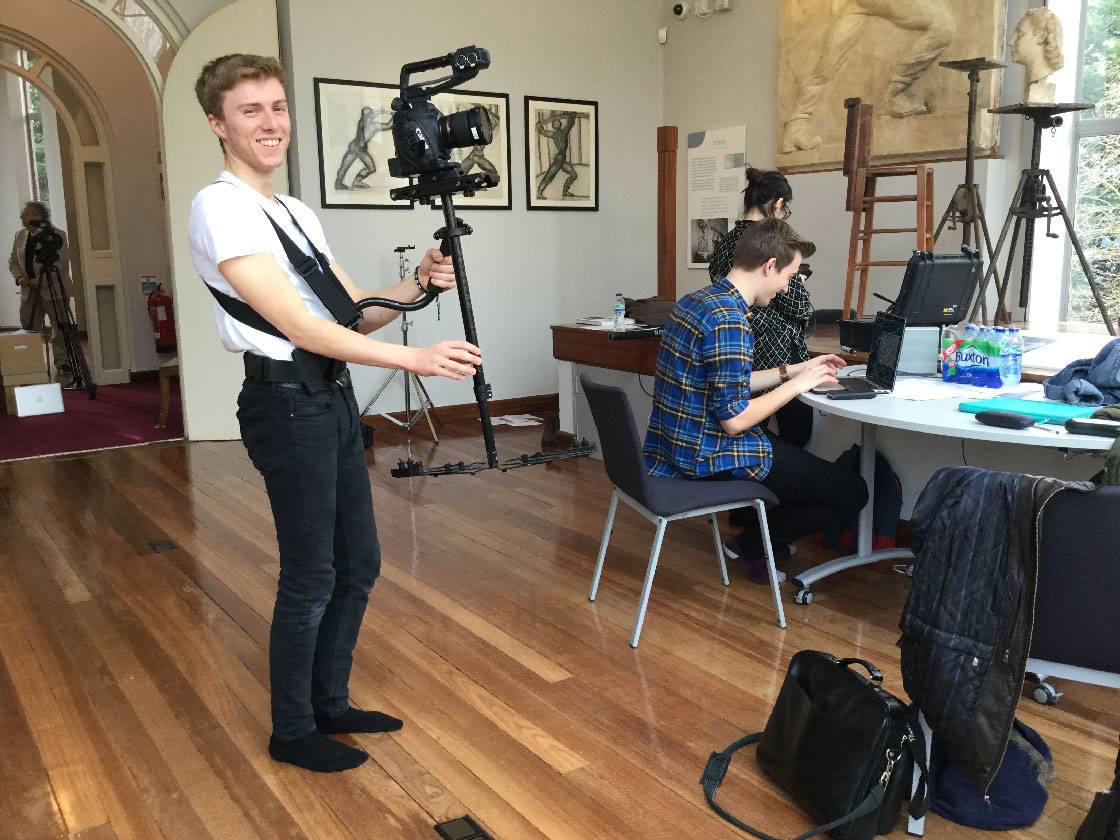
What our students say
After you graduate
This degree prepares you for a range of careers such as director, independent filmmaker, cinematographer, editor, artist-filmmaker, producer, sound recordist, designer and film programmer. The course is also a platform for further study or vocational positions in commercial film.
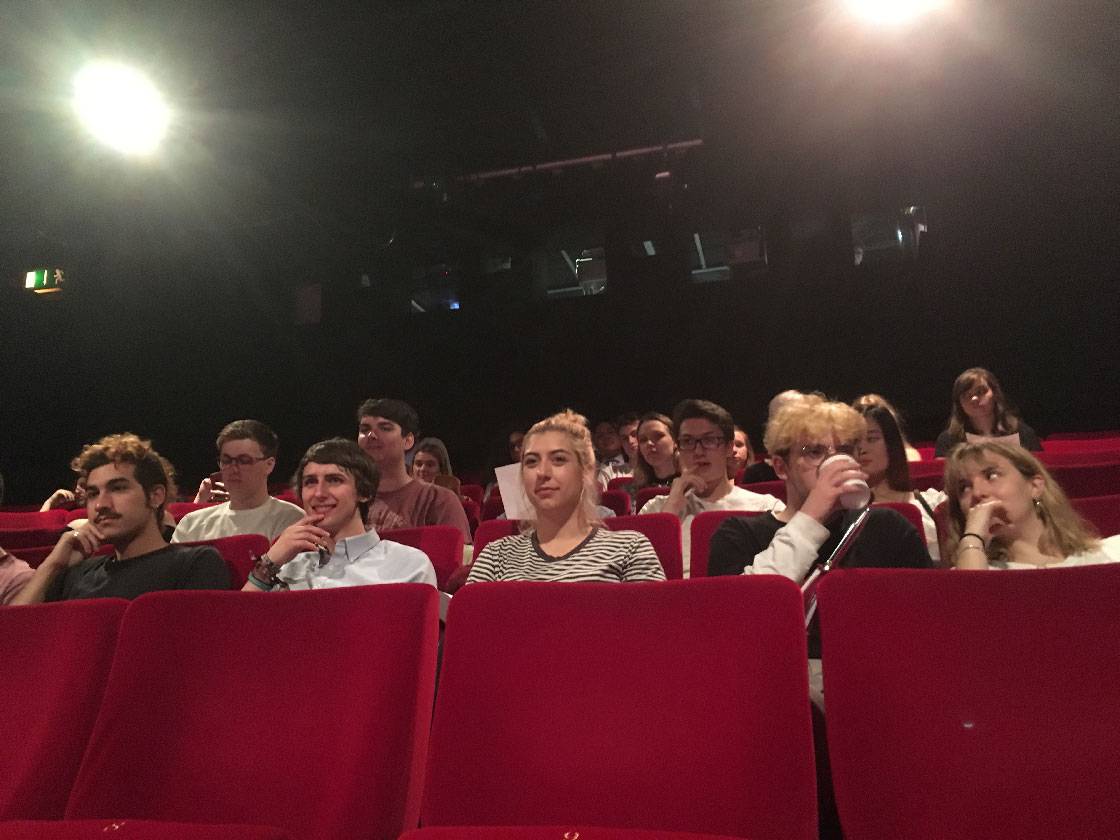
How we work with industry partners
The BA (Hons) Filmmaking programme has strong links within the moving image sector, through:
- active staff - all of whom are working within the industry in various capacities; and
- work experience programmes - offering students a way into key organisations in moving image.
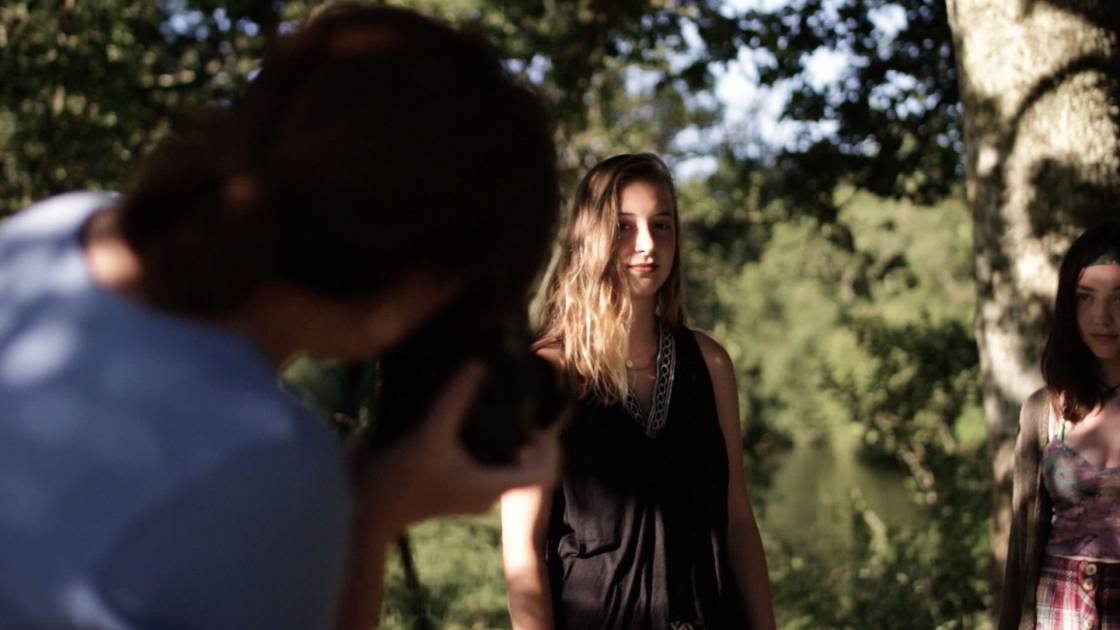
Film festival and award successes
Our Filmmaking students have an excellent history of screening their work at external festivals and events.
These include London Short Film Festival, Aesthetica Film Festival, Birds Eye Film Festival, the South London Gallery, Chicago Art House Film Festival, Lisbon Film Festival and the British Student Film Festival.
- Current second year student Dylan Friese-Greene has been shortlisted for the prestigious Grierson Awards for his short documentary Sian: Portrait of a Photographer.
- Chiemi Shimada's film Chiyo, screening at Open City Documentary Festival in September 2019, has been nominated for Best UK Short.
- Naomi Wong's graduation film 'Naturally Lazy' screened at the BAFTA-qualifying London Short Film Festival 2018.
- Chiemi Shimada's graduation film 'Fragments' screened at the BAFTA-qualifying Aesthetica Film Festival in York 2017.
- Zhao Siyu won Best Film at the London Independent Film Festival in 2017.
- Will Hooper's graduation film won Best Underground Film at Lisbon International Film Festival in 2016.
- Jacob Hesmondhalgh and Marie Hobson won Best Documentary Short at Weyauwega International Film Festival in 2015.
- Ed Chappell won the Young Greenhorn Film Award at Greenhorn Short Film Festival in 2014.
Key information set
The scrolling banner(s) below display some key factual data about this course (including different course combinations or delivery modes of this course where relevant).
Course changes and regulations
The information on this page reflects the currently intended course structure and module details. To improve your student experience and the quality of your degree, we may review and change the material information of this course. Course changes explained.
Programme Specifications for the course are published ahead of each academic year.
Regulations governing this course can be found on our website.
